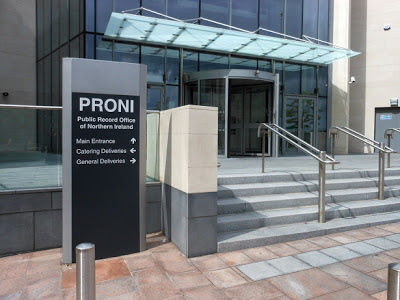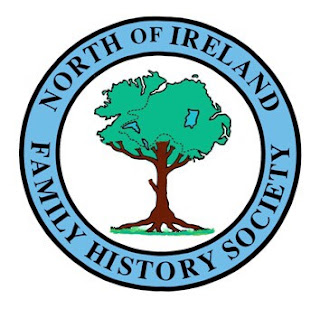A new BBC series has just started entitled Who Owns Scotland?, with the first episode currently available to view on the BBC iPlayer at https://www.bbc.co.uk/iplayer/episode/m00111y5/who-owns-scotland-series-1-episode-1 (UK access only).
Although a current affairs documentary touching on the history and politics of land reform, there is a lot for the family historian within this also, with the National Library of Scotland's Chris Fleet popping up, land reform campaigner and former MSP Andy Wightman, and also some discussion at Registers of Scotland, including commentary on the flaws within the Registers of Sasines in Scotland for identifying land in historic times, and the optimistic ambition for its modern equivalent, the Land Register, to replace it by 2025.
If interested in the topic, Andy Wightman's The Poor had No Lawyers: Who Owns Scotland and How They Got It is a definitive guide which I would recommend to any family historian to have in their personal library. The following is from a review of the book that I wrote in 2015:
Just now I am reading a remarkable book by Andy Wightman, entitled The Poor Had No Lawyers - Who Owns Scotland (And How They Got It). I have the new edition, published by Birlinn Ltd in 2013 (the original was produced in 2011), and the main reason I purchased it is the fact that land reform is fast becoming a political hot potato in Scotland. In a country of just over 5 million folk, half of the privately held land mass of Scotland is owned by just 432 people, a situation that has been virtually unchanged for centuries. In November 2004, Scottish feudalism was finally abolished, marking the end of a system that endured through most of Scotland since the 12th century. There is still a lot on the reform agenda to be addressed, and fast growing concensus appearing on what those changes should be on the one side by those who think the issue of land reform is unfinished business (which includes the Scottish Government), with an equally vociferous opposition from the landowners who still own vast estates across the country, and who want nothing but the status quo to endure. Whilst I took up the book to obtain more of a political education on the subject, in actual fact, this book is one that every Scottish based genealogist should also get stuck into.
Andy Wightman has long campaigned on the need for reform, but before laying out the political case for its need, he spends quite a bit of time looking at the historic background to the acquisition of land in the country. He kicks off with brilliant contempt for so-called Scottish independence heroes such as Robert the Bruce, calling him "a medieval warlord", who was "murderous, duplicitous, conniving and wholly devoid of any higher principles than his own advancement". From this point onwards, you know that he has no problem challenging the views of the establishment! But crucially, he then goes on to discuss how Scottish land was consolidated into the hands of a few landowners across the centuries in what he describes as a series of thefts.
There was the theft of common land by the Crown, which used feudalism to structure its management through royal prerogative (from 1503 James IV catalysed the process with an extensive programme to feu out Crown held lands). There was the theft of land from the Church before the Reformation, with many illegitimate offspring installed into corrupt bishoprics by the so called great and the good, from whom Church land passed into the hands of their 'noble' families. There was the support of the Lords of the Congregation at the Reformation of 1560 itself, not just for religious reasons, but to help finish off the job of securing the remaining Church lands - a process that actually caused problems for the new Kirk, as the assets it needed to finance its new programmes of education and discipline were squandered by the nation's nobles. There was then the subsequent successful effort of the nobility to formally legalise their possession of property seized from Church lands through the Registration Act and Proscription Act of 1617, with 'proscription' allowing ownership to be recognised for land that had been held for at least forty years. The book therefore explains the background to why devices such as the Registers of Sasines were actually created, and later why tailzies and other forms of documents that we use for family history research came into existence. Further land grabs are also recorded, such as those of the commonties and burgh commons.
There are great examples of how records developed across time also, including the development of Edinburgh New Town from 1766, and how feudal charters evolved as a consequence of its feuing plan. In older charters, burdens (conditions imposed by feudal superiors on vassals as to what they could do with land) were not detailed in the documents, but this caused problems with Edinburgh. Those who took the initial feus for the New Town agreed to design their buildings according to a plan, but the plans and conditions were not included in the charters - instead, the agreement was via contract law. When those original owners sold on their buildings, the new owners were not bound by the same contract, and as the charters did not list any obligations on what should be done with the properties in terms of their development, the new owners could do what they liked with their holdings. The addition of burdens in the charters from this point soon put paid to that. And so on.
The book obviously then goes into depth on the political consequences, and the author's beliefs on what still needs to be addressed, which you may or may not agree with. But if you like a little bit of politics, and at the same time have an interest in the records of Scotland used for genealogical research, Andy Wightman's book ticks many boxes, and is thoroughly recommended!
It is available from Amazon at www.amazon.co.uk/Poor-Had-No-Lawyers-Scotland/dp/178027114X/.
Chris
My new book Tracing Your Irish Ancestors Through Land Records is now available to buy at https://bit.ly/IrishLandRecords. Also available - Sharing Your Family History Online, Tracing Your Scottish Family History on the Internet, Tracing Your Irish Family History on the Internet (2nd ed), and Tracing Your Scottish Ancestry Through Church and State Records - to purchase, please visit https://bit.ly/ChrisPatonPSbooks. Further news published daily on The Scottish GENES Facebook page, and on Twitter @genesblog.

























